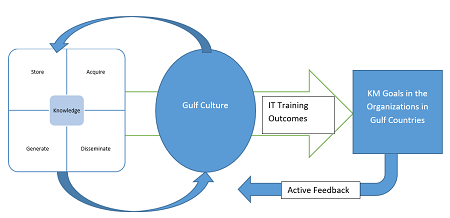


Indian Journal of Science and Technology
Year: 2020, Volume: 13, Issue: 14, Pages: 1486-1492
Original Article
Hamad AlBadri1*, Ashraf Badawood1
1College of Business, MIS, University of Jeddah, Jeddah, Kingdom of Saudi Arabia
*Corresponding author
Hamad AlBadri
College of Business, MIS, University of Jeddah, Jeddah, Kingdom of Saudi Arabia
Email: [email protected]
Received Date:06 April 2020, Accepted Date:27 April 2020, Published Date:28 May 2020
Background: The present research paper considers the use of knowledge management (KM) to enhance Information Technology training outcomes based on markets requirements, with particular focus on Gulf region. Method: Two key research questions would be answered in the paper, they are: what are the findings of the previous studies on role of knowledge management in supporting successful training outcomes, especially in Gulf region? What model, based on knowledge management concepts, can be used to enhance Information Technology training outcomes particularly in the Gulf region? Findings: To draw conclusions, a critical analysis was performed through comparing and contrasting the findings from observations of previous research and the scarce secondary data contained within the scientific sources. To ensure that KM is distributed in the Gulf countries rather than being centralized in certain organizations, a distributed model of knowledge management is proposed. This is based on a realization that different kinds of knowledge bear different KM implications. Improvements/Applications: The model encompasses best practices for knowledge creation, for knowledge sharing and for knowledge retrieval, which most of the reviewed studies identified as being important for enhancing Information Technology training outcomes in the Gulf region.
Keywords: Knowledge management; Model; Information Technology; Training outcome; Gulf region
© 2020 AlBadri, Badawood. This is an open-access article distributed under the terms of the Creative Commons Attribution License, which permits unrestricted use, distribution, and reproduction in any medium, provided the original author and source are credited.
Published By Indian Society for Education and Environment (iSee)
Subscribe now for latest articles and news.